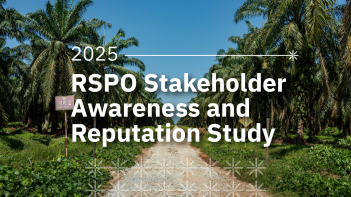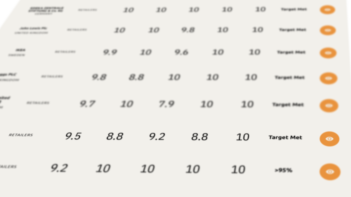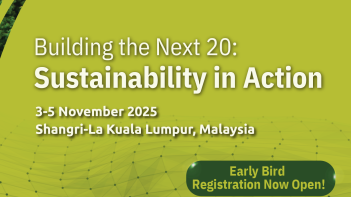NETHERLANDS, 21 September 2022: A new report finds that Europe is by far the largest consumer of sustainable palm oil in the world, accounting for 45% of total global use of certified sustainable palm oil.
Jointly commissioned by the Roundtable on Sustainable Palm Oil (RSPO), European Palm Oil Alliance (EPOA) and IDH – the Sustainable Trade Initiative, the report, ‘Sustainable Palm Oil: Europe’s business – fact, analysis and actions to leverage impact’, presents an in-depth analysis of the current trends and developments in the European palm oil market and supply chain.
Strategic role of Europe in the global context
The research, conducted by NewForesight, found that Europe’s total palm oil import is actually decreasing. While at the same time, the consumption of palm oil is increasing in other parts of the world where the market for sustainable palm oil products is still in its infancy. In this context, the report highlights the importance of maintaining Europe’s role in helping to shift the global market to sustainable palm oil.
An encouraging learning from the report, highlighted by Francesca Morgante, RSPO’s Senior Manager for Europe, is that European companies increasingly value sustainability: “As the data shows, we have seen a spike in sustainability communications. In Europe, licences for the use of the RSPO Trademark on products have doubled between 2020 and 2021, with those for corporate communication tripling in the same period.”
Key action areas
Europe faces unique challenges with specific oil palm products and their supply chains which reach sectors other than food, such as oleochemical and feed. As outlined in the report, 93% of total palm oil imports are RSPO certified sustainable, followed by CSPKO at 62%, and CSPKE at only 5%, meaning that some sectors still need to be further developed. CSPKO and CSPKE are mainly used in the oleochemical and feed sectors.
The report targets primarily consumer goods manufacturers, retailers and traders and identifies five key action areas through which palm oil end-users can improve the sustainability of their palm oil supply chains. In a review of current topics, the report also draws upon five case studies exploring market trends, proposed EU regulation for mandatory due diligence for deforestation, NDPE, Sabah’s Jurisdictional Approach, and national sustainable palm oil certification schemes.
Tailor-made action
In a message to the business community, Willem Klaassens, Director of Markets and SourceUp at IDH, says “This new report helps your company to identify key action areas depending on its maturity level in its sustainable palm oil journey. Whether you are a frontrunner, already on your
way, or, for the first time taking steps to improve sustainability in your supply chain, the sustainability journey is for everyone, and requires collective action from all stakeholders.”
Stephania Rivera, Sustainability Policy Officer at EPOA adds: “Companies can find in one single document key information they need to advance their sustainable palm oil journey. These initiatives are not only related to the work of our organisations, but also from many others. This was a conscious decision from our organisations, as we really need combined efforts to further advance sustainable palm oil supply chains.’’
Follow up strategies and actions will be discussed at The Sustainable Palm Oil Dialogue, the most important conference on Sustainable Palm Oil in Europe that will be jointly organised by RSPO, EPOA and IDH on 20 October 2022 in The Netherlands.
Download ‘Sustainable Palm Oil: Europe’s business – facts, analysis and actions to leverage impact’ from the RSPO, EPOA and IDH websites.
About RSPO:
The Roundtable on Sustainable Palm Oil (RSPO) was formed in 2004 with the objective of promoting the growth and use of sustainable oil palm products through credible global standards and engagement of stakeholders. RSPO is a not-for-profit, international, membership organisation that unites stakeholders from the different sectors of the palm oil industry including oil palm producers, palm oil processors or traders, consumer goods manufacturers, retailers, banks and investors, environmental or nature conservation NGOs, and social or developmental NGOs.
This multi-stakeholder representation is mirrored in the governance structure of RSPO such that seats in the Board of Governors, Steering Committees and Working Groups are fairly allocated
to each sector. In this way, RSPO lives out the philosophy of the “roundtable” by giving equal rights to each stakeholder group, facilitating traditionally adversarial stakeholders in working together to reach decisions by consensus, and achieving RSPO’s shared vision of making sustainable palm oil the norm.
The seat of the association is in Zurich, Switzerland, while the secretariat is currently based in Kuala Lumpur with satellite offices in Jakarta, London, Zoetermeer, Beijing, Bogotá and New York. For more information please visit www.rspo.org
About EPOA:
The European Palm Oil Alliance is a business initiative of palm oil refiners and producers. We believe that sustainably produced palm oil is a key food ingredient that fits in a nutritionally balanced diet and helps feed the world, protect biodiversity, and improve socio-economic development. We push for sustainable palm oil market transformation and closely collaborate with national initiatives active in the different European countries.
All our members commit to supply certified sustainable palm oil* in Europe and support a fully traceable NDPE (‘No Deforestation, No Peatland and No Exploitation’) supply chain. For more information see: www.palmoilalliance.eu.
*RSPO or equivalent
About IDH:
IDH, The Sustainable Trade Initiative is an organisation (Foundation) that works with businesses, financiers, governments and civil society to realise sustainable trade in global value chains. We believe that action-driven coalitions will drive impact on the Sustainable Development Goals and create value for all.
We work in multiple sectors and landscapes in Africa, Asia and Latin America with over 600 companies, CSOs, financial institutions, producer organizations and governments towards sustainable production and trade. We develop and apply innovative, business driven approaches to create new jobs, sustainable industries, and new sustainable markets to have large scale positive impact on climate change, deforestation, gender, living wages and living incomes, which will help reach the Sustainable Development Goals by 2030.
For more information: https://www.idhsustainabletrade.com/
For further information, kindly contact:
For RSPO: Kim Williams: [email protected]
For EPOA: Frans Claassen: [email protected]
For IDH: Natacha Moukannas: [email protected]
Keep reading

RSPO Gains Global Recognition in 2025 Stakeholder Study

Top 9 Retailers In Europe Committing To Sustainable Palm Oil

Register for RT2025 Early Bird Offer while it lasts!





